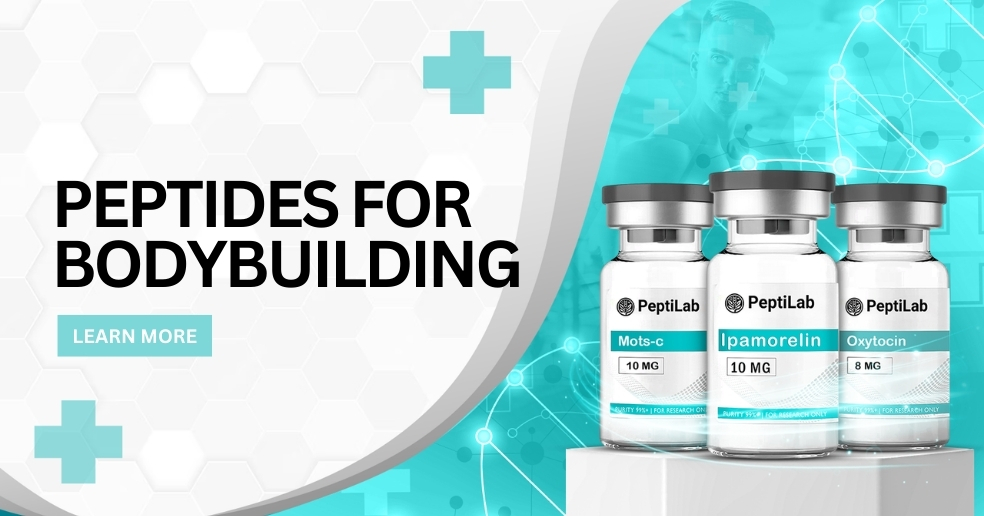Peptides
Peptides for Bodybuilding Benefits Uses and Side Effects
Peptides have gained immense popularity in the fitness and bodybuilding world due to their potential to enhance muscle growth, improve recovery, and promote overall physical performance. These small protein fragments act as signaling molecules in the body, influencing various physiological processes, including muscle development, fat metabolism, and anti-aging benefits.
In this article, we’ll explore how peptides work, their benefits, potential risks, and the best peptides for bodybuilding. Additionally, we will delve into the proper usage, cycling strategies, legal considerations, and how to choose the right peptide for your specific goals.
How Do Peptides Work for Bodybuilding?
Peptides work by signaling the body to produce more human growth hormone (HGH) or by interacting with specific receptors to trigger muscle growth and fat loss. Most bodybuilding peptides fall into two primary categories:
- Growth Hormone Releasing Peptides (GHRPs): These peptides stimulate the release of HGH from the pituitary gland, promoting muscle growth and fat metabolism.
- Growth Hormone Secretagogues (GHSs): These peptides enhance the body’s natural ability to produce HGH over time.
Some peptides work by increasing blood flow, enhancing nutrient absorption, or reducing muscle breakdown, making them useful for various phases of bodybuilding, including bulking, cutting, and recovery. Understanding their mechanisms allows athletes to optimize their peptide regimen for specific training goals.
Benefits of Peptides for Bodybuilding
Using peptides in bodybuilding offers numerous benefits, including:
- Increased Muscle Growth: Peptides like IGF-1 LR3 and GHRP-6 promote muscle hypertrophy, increasing lean muscle mass. This leads to more defined muscles and improved strength gains over time.
- Faster Recovery: Peptides such as BPC-157 and TB-500 help repair muscle tissues and reduce inflammation, speeding up post-workout recovery. Faster recovery means you can train harder and more frequently.
- Enhanced Fat Loss: Some peptides, like CJC-1295, improve metabolic function and promote fat oxidation. This makes them excellent choices for bodybuilders aiming to get shredded while maintaining muscle mass.
- Improved Endurance and Strength: Peptides such as GHRP-2 boost energy levels and improve physical performance. This allows athletes to push their limits in training sessions.
- Joint and Ligament Repair: TB-500 and BPC-157 assist in healing tendons, ligaments, and cartilage, reducing injury risks. Injury prevention is key to maintaining long-term progress in bodybuilding.
- Better Sleep Quality: Many peptides enhance deep sleep, leading to improved recovery and better overall health. Sleep is crucial for muscle growth, hormone regulation, and overall well-being.
- Enhanced Skin Health: Some peptides contribute to collagen production, leading to improved skin elasticity and a youthful appearance. This is an added benefit for those looking to maintain a healthy physique inside and out.
Popular Peptides for Bodybuilding
The following table summarizes some of the most effective peptides used by bodybuilders:
| Peptide | Function | Benefits | Dosage |
| IGF-1 LR3 | Muscle growth & fat loss | Increases muscle mass, burns fat | 20-50 mcg/day |
| CJC-1295 w/ DAC | HGH release | Enhances growth hormone levels | 2 mg/week |
| GHRP-6 | GH stimulation & appetite increase | Boosts GH secretion, aids recovery | 100-300 mcg/day |
| TB-500 | Injury healing & recovery | Accelerates tissue repair | 2-5 mg/week |
| BPC-157 | Tissue and muscle healing | Enhances muscle repair & reduces inflammation | 250-500 mcg/day |
| Ipamorelin | Growth hormone release | Improves muscle recovery, boosts HGH | 200-300 mcg/day |
| Hexarelin | Powerful GH release | Enhances strength & muscle density | 100-200 mcg/day |
Potential Side Effects and Risks
While peptides offer significant advantages, they also come with potential risks. Some common side effects include:
- Water Retention: Some peptides cause the body to hold excess water, leading to temporary weight gain.
- Joint Pain: Increased HGH production can sometimes cause discomfort in the joints.
- Increased Hunger: Certain peptides stimulate appetite, which can be beneficial for bulking but challenging during cutting phases.
- Numbness and Tingling: Some users report a tingling sensation in their extremities due to changes in blood circulation.
- Fluctuations in Blood Sugar Levels: Peptides that influence insulin levels may cause blood sugar imbalances.
- Potential Suppression of Natural Hormone Production: Excessive use of peptides can lead to the suppression of natural growth hormone production, requiring post-cycle therapy (PCT) to restore balance.
To minimize risks, it’s essential to use peptides responsibly, follow recommended dosages, and consult a healthcare professional before starting any peptide regimen. Proper cycling and monitoring side effects can help maintain long-term benefits.
How to Use Peptides for Bodybuilding
- Choose the Right Peptide: Select a peptide that aligns with your fitness goals, whether muscle growth, fat loss, or recovery.
- Follow Proper Dosage Guidelines: Overuse can lead to unwanted side effects.
- Administer Correctly: Peptides are typically injected subcutaneously or intramuscularly for maximum absorption.
- Cycle Your Usage: Avoid prolonged use to prevent desensitization and maintain effectiveness.
- Combine with Proper Diet and Training: Peptides are most effective when paired with a structured workout plan and balanced nutrition.
- Monitor Progress and Adjust Accordingly: Keep track of gains, recovery time, and potential side effects to optimize results.
Additionally, stacking different peptides can enhance results. For example, combining IGF-1 LR3 with CJC-1295 and GHRP-6 can maximize muscle growth and recovery.
Are Peptides Legal for Bodybuilding?
Peptides are legal for research purposes, but their use for performance enhancement is regulated in many countries. Some peptides are approved for medical use, while others are classified as research chemicals. Always verify local regulations before purchasing or using peptides for bodybuilding.
In competitive sports, peptides are often banned by organizations like the World Anti-Doping Agency (WADA). Athletes should check the regulations of their sport before using peptides to avoid disqualification.
Tips for Buying High-Quality Peptides
When purchasing peptides, consider the following factors:
- Source Reliability: Buy from a reputable vendor to ensure purity and effectiveness.
- Third-Party Testing: Look for companies that provide lab reports verifying the product’s quality.
- Storage and Handling: Peptides should be stored properly, usually in a cool, dark place, to maintain potency.
- Customer Reviews: Check feedback from other users to gauge the reliability of the supplier.
Closing Thoughts
Peptides offer an exciting avenue for bodybuilders looking to enhance muscle growth, recovery, and performance. By understanding their functions, benefits, and risks, you can make an informed decision about incorporating peptides into your fitness regimen.
With the right peptides, responsible usage, and a proper training routine, you can maximize your bodybuilding potential. Always prioritize high-quality sources like Peptide Worldwide to ensure the best results. Whether you’re an amateur fitness enthusiast or a seasoned bodybuilder, peptides can be a game-changer in achieving your physique and performance goals.

